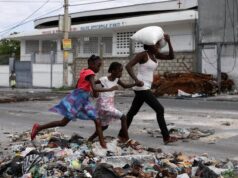New Zealand border to reopen from next month, PM Ardern says

New Zealand says it’s keen to welcome back international tourists
New Zealand has brought forward plans to reopen its borders to international travellers after a Covid lockout of more than two years.
Australians will be allowed to enter the country without needing to quarantine or isolate from 13 April.
Fully vaccinated travellers from about 60 countries on a visa-waiver list will be able to arrive from 2 May. Those nations include the UK and US.
All arrivals will have to show a negative Covid test.
New Zealand shut its borders in March 2020 as the pandemic spread. They have remained closed, except for a short-lived travel bubble with Australia.
Currently only New Zealand citizens are allowed in and out.
Prime Minister Jacinda Ardern said New Zealand was “ready to welcome the world back”.
“We have now received guidance that it is safe to significantly bring forward the next stage of border reopening work, bringing back our tourists,” she said on Wednesday.
People who already have a visa – but are from outside the visa waiver list – will be eligible to enter the country on 1 May.
While tough lockdowns and virtual isolation helped the country get a reputation as a Covid success story, transmission rates have soared recently.
Many Kiwis are struggling to grasp how their country has gone from fewer than 1,000 cases a day to more than 20,000 daily infections in just a couple of weeks. Ms Ardern had pursued an elimination strategy until October last year.
But New Zealand now has a 95% vaccination rate in the eligible population. It has recorded only 115 Covid deaths since the pandemic began.
Despite some easing of isolation requirements for Covid patients, the country remains in its highest level of restrictions with limits on gatherings and mask mandates in many settings.
Mandates have left unvaccinated people in some sectors without jobs, leading to three weeks of protests in the capital Wellington.




